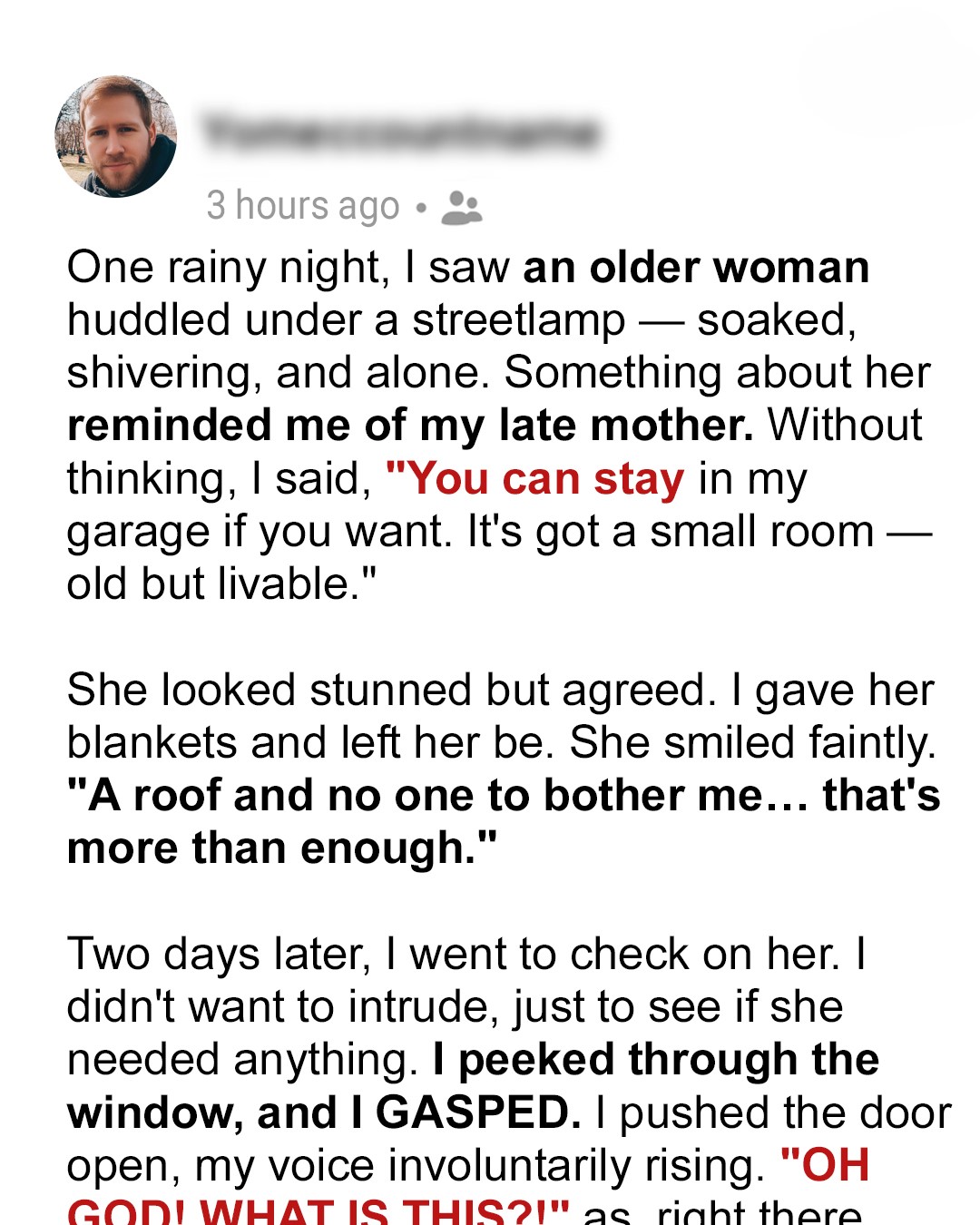I Gave Shelter to a Homeless Woman in My Garage, Two Days Later, I Looked Inside and Cried, Oh God! What Is This?!

I never imagined that one rainy night would change everything. My name is Henry, and after my mother passed away last year, I found myself living alone in our old family home—a house that now echoed with silence and loneliness. I had been drifting through my days, caught between work and my long-distance relationship with Sandra, yearning for a spark that made me feel alive again.
That night, as I hurried to my car, I noticed a woman huddled beneath a flickering streetlamp. She wasn’t begging or pleading; she simply sat there, drenched by the rain, as if she belonged to it. Something about her quiet dignity compelled me to speak up. “Hey,” I called, “why don’t you find shelter somewhere?” Slowly, she turned her gaze toward me. Her face, etched with hardship, held eyes that shone with intelligence and kindness—a look that reminded me of my mother. Without a second thought, I offered her refuge in my garage.
She hesitated for a moment. “Your garage?” she asked.
I nodded. “It’s not much, but there’s a small room inside with a bed, a toilet, and running water. It’s been neglected since Mom’s caregiver used it, but I promise I’ll clean it up this weekend.”
A soft, resigned smile spread across her face. “I’ve got nothing left to lose. I’m Dorothy,” she said.
I introduced myself and quickly fetched some food from a nearby restaurant before driving to Sandra’s apartment. I needed to explain things to her before she encountered Dorothy unexpectedly. When Sandra learned I’d let a homeless stranger into my garage, she was understandably anxious. “Henry, what if she’s dangerous?” she protested while making toasted sandwiches in her small kitchen. I reassured her, explaining that I’d locked the door to the main house and that Dorothy would only have access to the garage’s forgotten clutter.
The next day, I left a basket of groceries at the garage door and assumed Dorothy was still resting. That evening, I noticed the garage light on—a subtle sign that something had changed. Curiosity won over, and I peered through the window. I froze. The space had transformed completely. Gone was the clutter of old boxes and dusty furniture. Instead, the room was tidy, even inviting, with a worn couch neatly arranged with a throw blanket, a small table fashioned from an old crate, and a vibrant succulent that brightened the corner. It felt less like a forgotten space and more like a real home.
There, at the table, sat Dorothy. Clad in a clean, vintage dress that I recognized from an old family photo, she appeared refined and at ease, as if she’d always belonged in a cozy living room rather than a dilapidated garage. I pushed the door open, my voice trembling with disbelief. “Oh my God, what did you do?” I asked.
Dorothy looked up calmly, a gentle smile on her lips. “I just cleaned up a little. I found some things buried under the mess—you had treasures here, you know. The lamp needed a new bulb, which I found in a box, and that plant outside I rescued. It all made sense.”
I was stunned. “Who are you, really?”
After a moment’s pause, she replied, “I used to be a professor of English literature. I taught at a university, surrounded by books, students, and lively debates about Shakespeare and Dickinson. That was long ago—before I lost everything.”
Her story unfolded slowly, each detail laced with both wistfulness and sorrow. She recounted the tragedy of losing her parents in a car crash when she was in her thirties—a moment that shattered her world. Later came the pain of losing her husband, Jack, and her son, David, in a senseless robbery gone wrong. “I remember holding David in my arms,” she whispered, her voice breaking. “One moment he was there, and then he wasn’t.”
I listened in silence, my heart aching for the woman before me. In sharing her loss, Dorothy revealed how grief had led her to retreat from life, until one day, she decided to reclaim a piece of herself by making a small space her own. Over the weeks that followed, I did everything I could to help her adjust—a proper meal of pasta and garlic bread, new bedding, and a few personal touches. Sandra eventually came over to meet her, admitting that Dorothy’s wit and kind manner even charmed her, despite initial misgivings.
Before long, Dorothy found work at the local library and moved into a modest apartment of her own. One evening, as I visited her new place, she greeted me with a cup of tea and neatly arranged books on her shelves. “You made it, Dorothy,” I said softly.
She smiled warmly, replying, “No, Henry. We made it.”
In that moment, I realized that our encounter had saved us both. Dorothy had given me a renewed sense of purpose and a reminder that even in our darkest hours, a small act of kindness can transform lives. And as we continued to rebuild our separate lives, I never forgot how opening my heart to a stranger turned out to be the most rewarding decision I ever made.